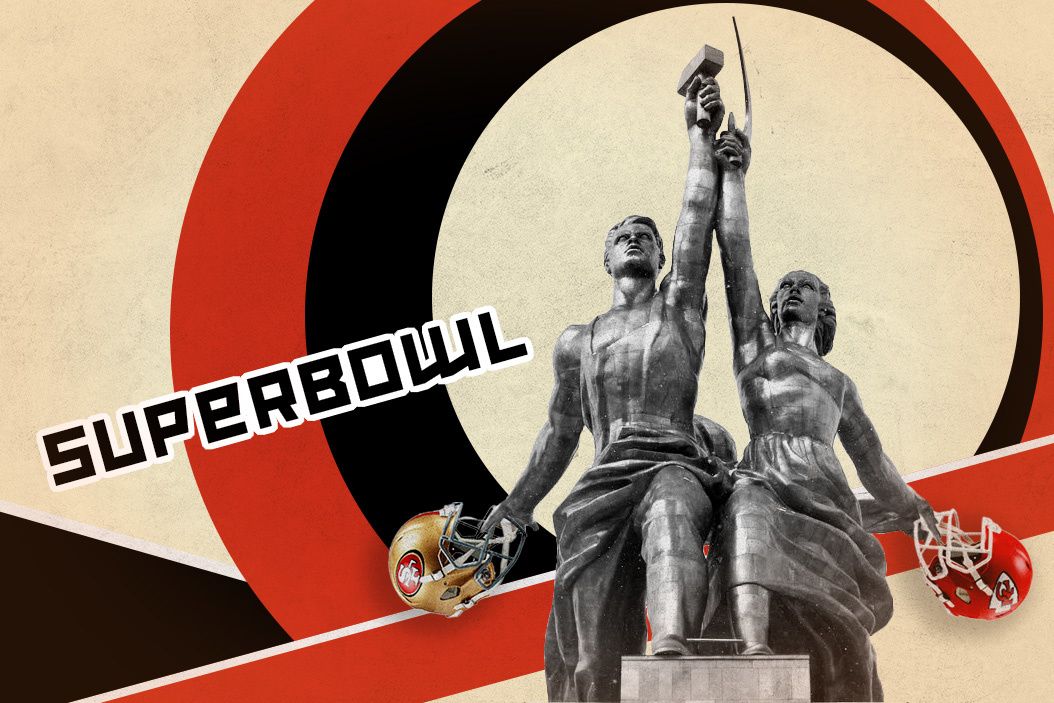Today, at your caucus-themed Super Bowl party, as the 49ers try to hold back the Chiefs, you needn't bother to watch the game itself. Why? We already know who the winner is: the political principles of Senator Bernie Sanders.
That's right. The sport you thought you could rely on as the most 'Merican, capitalist flag-flyin,' Big Gulp guzzlin', red-meat, whitey-tighty, blue-collar battle of uncoddled smashmouth neo-gladiators – and where, might we add, Super Bowl ads cost a pretty $175,000 per second – is, today, an organization committed at its core to the redistribution of wealth. Take from the rich, give to the poor – that's the most socialist of all socialist socialisms, right? Feel the Bern.
Consider: each year, the league seizes money from the richest winningest teams, and redirects it to the poorest losingest teams. So, whoever scores the most points on Sunday will get a bittersweet trip to Disneyland: you may win the game, comrades, but by coming in first you lose millions in league-re-distributed funds. Off you go into the long hard winter of the NFL spring, punished for your success. Call it a wealth tax.
Why does the NFL do this? Out of compassion for teams that fall too far behind. And by compassion, we mean "concern for TV ratings." Lopsided seasons would be bad for viewership, which would be bad for revenue, which would be bad for everyone from the nosebleeds to the skyboxes. Keeping things competitive means tackling inequality on the gridiron.
Not that the NFL has a clean record on competition, of course. Back in '66, the NFL and the AFL merged into a one-state, ahem, one-league, system specifically to keep star players from leveraging contracts between competing leagues. Sure, that was a clear violation of the Sherman Antitrust Act, but – quiet, the game's on.
Now, we're not breaking news here. Journalists have pointed out this irony. Comedians too. Even the host of American Idol (not that one, the other one.) Cleveland Browns owner Art Modell decried the NFL as an outfit run by "a bunch of fat-cat Republicans who vote socialist on football." (I'm Bernie Sanders, and I approved this message.)
But before you pigskin pinkos demand every Cheesehead become a dyed-in-the-wool Bernie bro, consider where this comparison falls short. For one thing, wealth redistribution isn't actually socialism. For another, sports leagues are zero sum – you win, I lose – in a way that economies and societies really aren't. And plus, if the NFL were really socialist, it would give workers control over the means of production: if that were the case Patrick Mahomes would be Most Valuable Executive Vice President by now.
The touchdown: This analogy doesn't quite hold up, despite it being a perennial claim. It's like Tom Brady's footballs – seemingly airtight, yet deflates somewhat upon further inspection. But our prediction is you'll hear it again next year.
Our other prediction: Chiefs by 9.
Kevin Bleyer is an Emmy-winning veteran of The Daily Show with Jon Stewart and Dennis Miller, and the author of Me the People: One Man's Selfless Quest to Rewrite the Constitution of the United States.
More For You
Sovereignty has become one of the most powerful, and least defined, words in tech policy. At the 2026 Munich Security Conference, SAP global head of government affairs, Wolfgang Dierker, explains why governments and enterprise customers are demanding more control over their data, cloud infrastructure, and AI systems amid rising geopolitical uncertainty.
Most Popular
TODAY at 12 pm ET: Watch our Global Stage live premiere from the Munich Security Conference
Tune in today at 12pm ET/6pm CET for the live premiere of our Global Stage from the 2026 Munich Security Conference, where our panel of experts takes aim at the latest global security challenges. NY Times National Security Correspondent David Sanger moderates the discussion with Benedetta Berti, Secretary General, NATO Parliamentary Assembly; Ian Bremmer, President & Co-founder, Eurasia Group & GZERO Media; Dr. Wolfgang Dierker, Global Head of Government Affairs, SAP; and Brad Smith, Vice Chair & President, Microsoft.
Alina Polyakova, President and CEO of the Center for European Policy Analysis, warns that NATO faces a defining moment.
From the sidelines of the 62nd Munich Security Conference in Munich, Polyakova told GZERO's Tony Maciulis that the Arctic has become “an arena of incredible global competition,” with Russia and China expanding their ambitions. While President Trump’s focus reflects “the right instincts” on security, she argues allies must strike a mutual deal to secure the region together.
